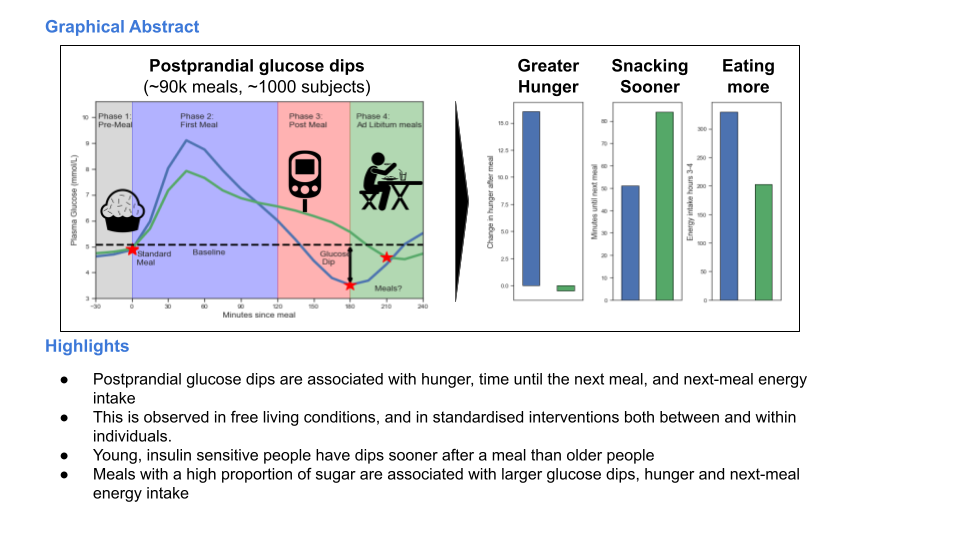
Participants also carried out a fasting blood sugar response test (oral glucose tolerance test), to measure how well their body processes sugar.
Participants wore stick-on continuous glucose monitors (CGMs) to measure their blood sugar levels over the entire duration of the study, as well as a wearable device to monitor activity and sleep.The research team also asked people to record their levels of hunger and alertness using a phone app, along with exactly when and what they ate over the day.
Previous studies looking at blood sugar after eating have focused on the way that levels rise and fall in the first two hours after a meal, known as a blood sugar peak.However, after analyzing the data, the PREDICT team noticed that some people experienced significant ‘sugar dips’ 2-4 hours after this initial peak, where their blood sugar levels fell rapidly below baseline before coming back up.
Dr Sarah Berry from King’s College London, who was involved in the study, says, “It has long been suspected that blood sugar levels play an important role in controlling hunger, but the results from previous studies have been inconclusive.We’ve now shown that sugar dips are a better predictor of hunger and subsequent calorie intake than the initial blood sugar peak response after eating, changing how we think about the relationship between blood sugar levels and the food we eat.â€.
Big dippers also ate 75 more calories in the 3-4 hours after breakfast and around 312 calories more over the whole day than little dippers.Our discovery that the size of sugar dips after eating has such a big impact on hunger and appetite has great potential for helping people understand and control their weight and long-term health.â€.
Comparing what happens when participants eat the same test meals revealed large variations in blood sugar responses between people.There was also some variability in the size of the dips experienced by each person in response to eating the same meals on different days, suggesting that whether you’re a dipper or not depends on individual differences in metabolism, as well as the day-to-day effects of meal choices and activity levels.By demonstrating the importance of sugar dips, our study paves the way for data-driven, personalized guidance for those seeking to manage their hunger and calorie intake in a way that works with rather than against their body.â€.
To help improve the country’s overall public health and bring science to the everyday person, ZOE now offers an at-home test that measures whether you’re a big or little dipper and provides personalized advice on the best foods to eat to take back control of your health and weight.
“Clearly, when we're thinking about eating behaviour in these disorders, we need to take a more nuanced approach.†Using blood biomarkers taken from the patients at various stages during the experiment, the team established that those with anorexia had raised levels of ghrelin, a hormone that tells the body it is hungry, when stressed.
“If we can get a better understanding of the mechanisms behind how our gut shapes those higher order cognitive processes related to self-control or decision-making, we may be in a better position to help people affected by these extremely debilitating illnesses.
More than 1.6million people in the UK are thought to have an eating disorder, three-quarters of whom are women.
Research last year found that eating disorders are soaring, with almost 20,000 people a year being admitted to NHS hospitals, amid concern that social media is fuelling a growing crisis.